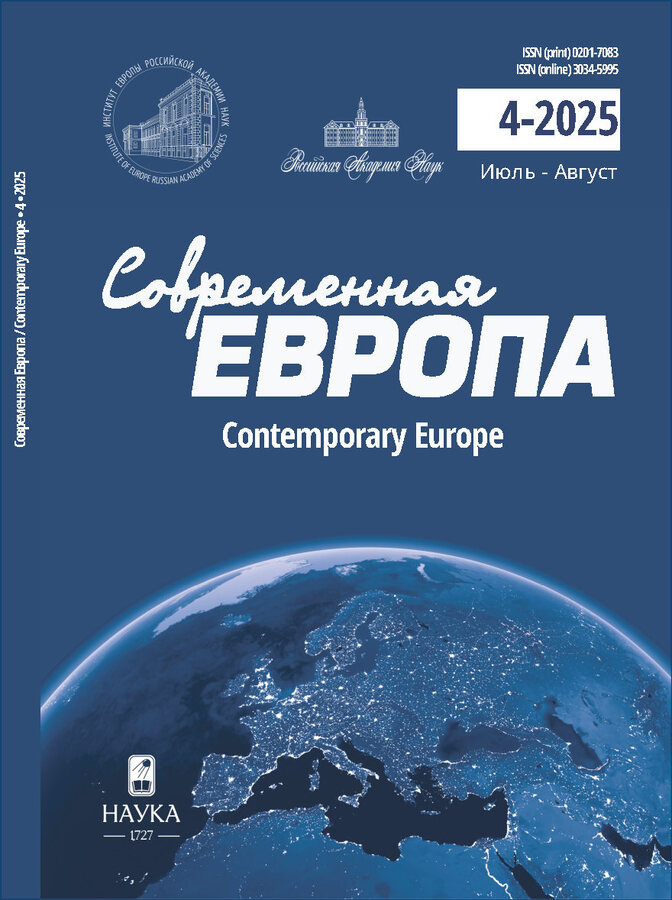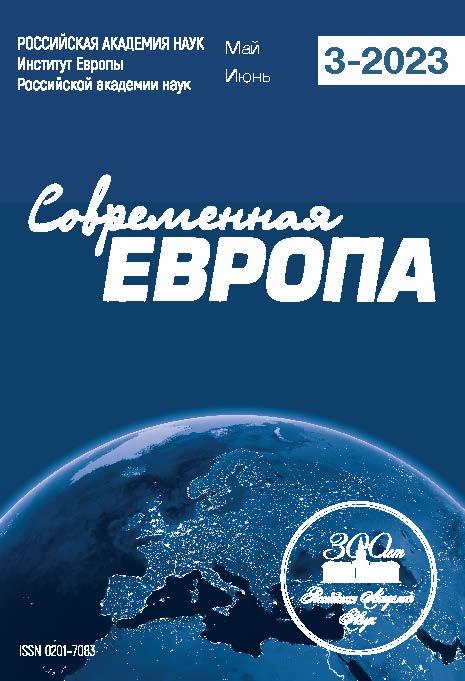№ 3 (117) (2023)
Статьи
Влияние расширения ЕС на скорость принятия решений
Аннотация
 5-19
5-19


Ограничения на въезд российских граждан в страны ЕС: политические и правовые аспекты
Аннотация
 20-32
20-32


"Стратегический суверенитет" и "Стратегическая автономия" в дискурсе ЕС: морфологический анализ идеологии
Аннотация
 33-44
33-44


Россия в публичном дискурсе и общественном мнении Итальянской Республики
Аннотация
 45-56
45-56


Проблема Косово: Сербия перед решающим выбором
Аннотация
 57-67
57-67


Содействие ЕС в решении проблемы научно-технического развития Иордании
Аннотация
 68-81
68-81


Поддержка малого и среднего бизнеса в целях устойчивого развития ЕС
Аннотация
 82-94
82-94


Экономика Испании на траектории процесса модернизации
Аннотация
 95-106
95-106


Ускоренные университеты: опыт Европы и Азии
Аннотация
 107-117
107-117


Государство и гражданское общество: особенности немецкого подхода
Аннотация
 118-130
118-130


Политическая медиагеография: потребление смысла "феминизм" в странах Северной Европы
Аннотация
 131-142
131-142


Теология и политика. попытки политического подчинения Церкви
Аннотация
 143-151
143-151


Миграция и исламский фундаментализм в контексте постмодернистского дискурса
Аннотация
 152-163
152-163


Европейцы в Японии: от торговли к знаниям
Аннотация
 164-177
164-177


Прошлое и будущее геополитики: отрицание отрицания
Аннотация
 178-187
178-187


Взгляд из России на политический ландшафт Латинской Америки
Аннотация
 188-197
188-197


Portrayal of Russian Foreign Policy towards Georgia in 2008 and Ukraine in 2014 in the Western and Russian Academia
Аннотация
This study examines how the Russo-Georgian War in 2008 and the Ukraine Crisis in 2014 were discussed in Western and Russian academic circles. The findings show that historical accounts as well as various theoretical frameworks were used to explain the Russian foreign policy (RFP) regarding these conflicts. In comparison, although mono-theoretical models were utilized in both cases, they are more dominant in the works of Western scholars. On the other hand, inductive historical explanations were used more in the works of Russian scholars. Another important point is that in the latter studies, alternative accounts to the Western unilateralism are more popular. These accounts reveal themselves with concepts such as “multipolar world” or “Eurasianism”. As for the mono theoretical accounts, realist approaches seem to be the dominant framework in both cases. Realist frameworks emphasize the improved material capabilities of Russia and external pressures in its sphere of influence. The later component of the realist approach is stressed more by scholars from both academic circles. Moreover, even the studies that utilize different approaches, such as ideational explanations, domestic political factors, decision-maker related approaches, or the ones that highlight the regional competition, emphasize the role of the strategic or geopolitical imperatives as a factor that cannot be ignored regarding how RFP is formed and implemented.
 198-209
198-209


Страницы борьбы советской дипломатии за членство УССР и БССР в ООН
 210-213
210-213












